#quote from 'the complete vader'
Text
so apparently in the earliest drafts of phantom menace, lucas had anakin at 12 years old, but eventually knocked it down to 9, because anakin leaving his mom at 12 "is not nearly as traumatic" as it would be at 9. this separation really is a foundational trauma for the tragic character, and he needed to make it hit as hard as possible, so he found the sweet spot of bad timing for qui-gon to find anakin. it makes me think of AUs where he is both older and younger and able to handle separation and transition better, both help avoid the problem of his psychological misfit with the jedi. his age of discovery is a vital part of all the things that had to right (for sidious) and wrong (for the jedi) for darth vader to happen, like the deck was intentionally stacked against anakin's happiness from the beginning on purpose for dramatic reasons. lucas's design of the backstory for such an established villain was really an archaeology of trauma that led to such a disaster, scraping away layers of the adult psyche to see the damaged child inside. many didn't like that the movie was about a whiny kid, but it's fascinating to me that lucas wanted vader to be understood as having that child weeping inside.
1K notes
·
View notes
Text
This may be a Bad Take but I think a lot less people would have issues with Padmé Amidala's RotS characterization if they realized that her role in that movie is largely symbolic and that Anakin's attitude towards her is meant to represent the inherent tension between liberty and security (which is clearly one of the main themes in a movie that has Anakin quote George W Bush as he falls to the Dark Side).
Padmé represents the best of democratic values: the capability to perceive everyone's inherent worth, the trust in state institutions, the morality, the benefits and drawbacks of resolving issues in a democratic manner and within the system (she often finds herself helpless in the face of corruption, for example). Padmé's ideals are the core of her character, to the point that she basically is her ideals. Basically, Padmé is to the Galactic Republic what Marianne is to the French Republic.
Now, you may have issues with a female character being used as a personification of a state or a political system, but not only is this a millennia-old narrative tradition, I also feel like you're probably barking up the wrong tree, because George Lucas LOVES using characters as symbols for abstract concepts: Luke as the Hero with a Thousand Faces, the Good vs. Bad Father dynamic with Obi-Wan and Vader, etc. This is completely on brand for the way George Lucas in particular constructs characters.
Even Padmé's most famous line, "So this is how Liberty dies," is indicative of this (and I love the concept of a former slave boy falling in love with Liberty herself).
Padmé dies because Liberty dies, not because she's a weak useless woman.
And Anakin's relationship to her potential death is very much... an indictment of reactionary politics and the War on Terror?
Anakin loves Padmé because she is fair-minded and understanding even when he doesn't deserve it, because she is tolerant, because she is kind, because she fights for justice, because she uplifts people. This is what he is in love with and what he is trying to preserve.
But in the face of nebulous threats, some real and some manufactured, he tries to save her by trampling all over what she stands for. And what she stands for is her. Therefore the very act of trying to save her is what ends up killing her, just like trying to keep your democracy safe by increasingly cruel and authoritarian measures inevitably kills it. Anakin claims that he loves her, that he's protecting her, but he is unwilling to listen to anything she has to say about it, just like plenty of people whose mouths are full of freedom but don't want to think about or apply the values that they are supposedly defending. What she believes no longer matters as long as she loves and comforts and uplifts him (and when she doesn't he goes into a rage).
Everything Padmé stands for, her very way of life and her very way of doing things, no longer exist at the end of RotS. She was becoming increasingly static and helpless during the movie because her way of doing things no longer works as the Republic becomes mired in cruelty and corruption, she cannot do anything but set foundations for an eventual rebellion and hope that a spark of hope survives. She can no longer survive in this new system, and it is in her nature to rather die than compromise herself in order to work within it. In a symbolic way, she quite literally cannot survive if she has to exist within it. She IS Liberty, and it would be a paradox if she survived. She dies and their children - another thing Anakin is fighting to protect, like many people who are "defending freedom" "for the children!!1!" - are made orphans, left to their own devices, forced to fight and rebuild things from scratch because she can no longer nurture them or protect them. This is a political metaphor y'all.
And in this reading, even Shmi's death ends up working better if you squint? Because even though Anakin's anger over her death stems from clear injustice and is fundamentally righteous, the fear and rage that this creates in him, and his inability to cope with it, is what directly causes him to both fear for Padmé's safety and to eventually smother her due to that fear. And to eventually become what he fears, killing Liberty, depriving himself of liberty in the process by becoming Sidious's blind slave, and literally destroying the future of an entire generation of (Jedi) children.
Now, I'm not saying that this makes a more psychological analysis of Padmé's character invalid or that this is the only role that she plays (for example, while Obi-Wan is the "good father figure" in ANH, he's clearly many different things across all the movies and clearly has an established characterization beyond that, and so does Padmé), but I think looking at it through this particular lens does make the choices made for her character less baffling and more indicative of the larger themes of the prequels.
210 notes
·
View notes
Text
Debunking the "The Jedi are Evil" Theory Made by The Film Theorists PT 7
Point 7 - The Jedi are to Blame for Anakin's Fall
Matthew quote, continued:
"Hm...didn't Yoda once say something about suffering? Anger leads to hate, hate leads to suffering? In this case, it was ignorance that led to suffering and suffering that led to hate."
"And I don't know about you, but it seems to me that if the Jedi had bothered to take even the smallest modicum of effort to keep the family of their Padawan intact, the entire descent of Darth Vader from Light Side to Dark Side because of his hate, pain, suffering--all of that could have been pretty easily avoided."
Like I said in the previous post, if Anakin had actually told his fellow Jedi about his dreams, he could have saved her!
The Jedi are not at fault for not being omniscient!
And the last thing we're going to do on this post is absolve Anakin of blame and instead blame the Jedi for their own genocide and his actions.
No.
Anakin made his own choices, no one forced his hand.
He chose not to tell anyone about his dreams, he chose to massacre the Tuskens, he chose to get his men killed and put them in danger, he chose not to tell anyone about his dreams about Padme in any real detail so they could help, he chose to massacre the Jedi, he chose to kill Padme, and he chose to participate in the genocide of the Jedi and the oppression of the galaxy for the rest of his fucking life.
He chose that.
And, if I'm gonna be completely honest in this post, blaming the victims of a genocide for their own genocide makes you sound like a fucking fascist.
#star wars#sw prequels#the clone wars#pro jedi#pro jedi order#in defense of the jedi#anti anakin skywalker#anakin skywalker critical
85 notes
·
View notes
Text
The Prequels completed the saga
"The original idea for Star Wars was one movie about the tragedy of Darth Vader. But as the story grew, it ended up being three movies and the backstory was never explained. I decided it would be important to finish it off and do the backstory because things that I thought would be self-evident about the story, the audience didn't get. Over the 10 years after Return of the Jedi, I realized people misunderstood a lot—such as where Anakin came from. So it was a way of finishing the whole thing off." —George Lucas
Lucas repeatedly says here that the Prequels were his way of 'finishing off' the story that he began telling in the Original Trilogy. This is pretty crucial information, but it is yet another element of Lucas' saga that is continually misunderstood. Even after the Prequels were released, not only did many fans STILL completely miss the point of Anakin/Vader as a character (and the fact that his rise, fall, and redemption was the main plotline of the story), but they also failed to appreciate the various ways in which the Prequels mirrored, complemented, and, most importantly, FINISHED the saga. Nowhere is this completion made more explicit than in the RotS novelization (which was written in consultation with Lucas), which states: "it is already over. Nothing can be done to change it". The novelization was released alongside the film in 2005, and it was specifically intended to refer to the events of the Original Trilogy and the Prequels. Far too many fans these days like to apply that famous line to whatever part of 'Star Wars' they want, and in doing so, treat the Disney-canon and Lucas-canon as though they were interchangeable. They are absolutely not. Lucas' saga—aka, the Skywalker saga—is a complete story constructed as two trilogies that perfectly balance one another, both visually and thematically. Disney's canon, by contrast, is inconsistent, incoherent, and open-ended, not to mention inherently destructive to the integrity of the (original) Skywalker saga. It's disingenuous to try to apply that quote to the current Disney canon, which didn't even exist in 2005 and was not factored into that statement at all. The whole point of the Prequels, and particularly the tragic climax of Revenge of the Sith, was to retroactively conclude the story of the Skywalker saga that began with the Original Trilogy. And what story is that? In Lucas' own words, "it’s a certain story about Anakin Skywalker and once Anakin Skywalker dies, that’s...the end of the story."
#the prequels#george lucas#anti-disney#anti-sequels#pro lucas saga#the skywalker saga#the real skywalker saga#anakin skywalker#prequels appreciation#the chosen one#anakin is the central figure of the saga#the story is about him#i will keep being a broken record about this because the sw fandom refuses to accept this FACT.#you can't take the Sky(guy) from me
55 notes
·
View notes
Text
Debunking Misconceptions about Darth Vader's Power Level
This is a continuation of my main post proving that Darth Vader is the most powerful Sith in Star Wars Canon. Please check out my original post before reading.
“Darth Vader’s being a cyborg prevented him from reaching his Force potential”
Incorrect. Darth Vader’s suit was not a hindrance to his power. If anything, it made him stronger in the dark side.
These quotes from Lords of the Sith say so.
The armour separated him from the galaxy, from everyone, made him singular, freed him from the needs of the flesh, the concerns of the body that once had plagued him, and allowed him to focus solely on his relationship to the Force.
He stared at his reflection a long time. His injuries had deformed his body, left it broken, but they’d perfected his spirit, strengthening his connection to the Force.
The loss of his limbs causing him to lose potential doesn't even make any sense. Midichlorians are measured per cell, not per body. Vader may have lost his limbs, but the rest of the body is still just as powerful.
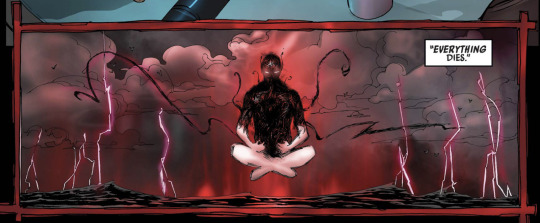
If you go by the logic that more biomass means means more powerful, Yoda should be the weakest Jedi on the Jedi Council since he has the least biomass of any of them. It doesn't make sense.
Additionally, when his suit was shut of by its creator, Cylo in the Darth Vader (2015) comic series, Vader used the Force to move his body so he could kill him.
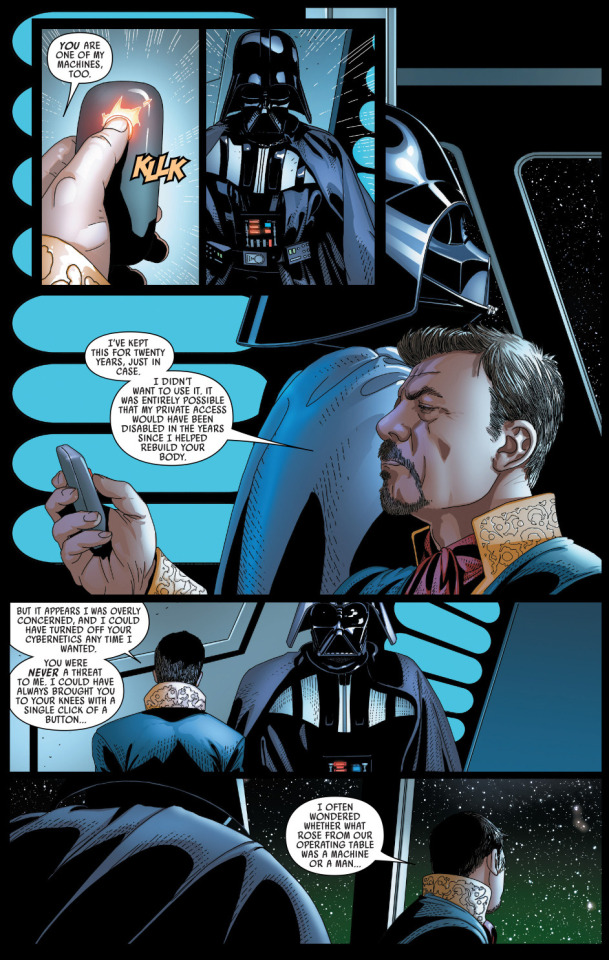


Even with his suit deactivated, Darth Vader is still a lethal opponent.
So no, Vader's suit was not a hindrance to his Force power.
“Vader’s suit was intentionally designed by Sidious to make him weaker and to be painful”
This is another thing that is often assumed by people because it was true in Legends, but it simply isn’t true in Canon.
In Darth Vader: Dark Lord of the Sith (2017), immediately after Vader gets his suit, Sidious asks Vader what he thinks of his suit. He doesn’t begrudgingly say he hates it. Instead, he just says:
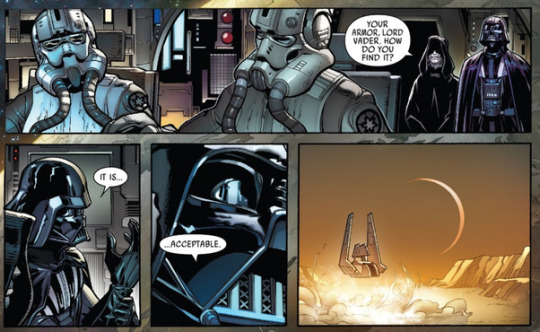
Later in the series, after completing the creation of his new red lightsaber, which he had to kill a Jedi to do, its shown that Vader fixes his own suit to his liking, and Sidious even approves and encourages this.

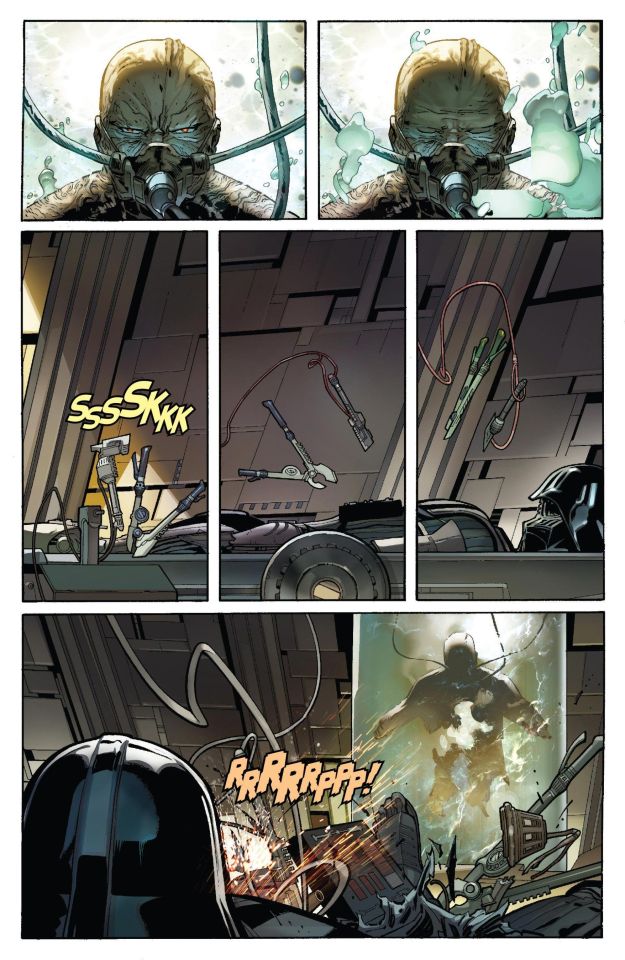
Vader even gets pissed off at the idea of anyone else fixing his armor. Unlike in Legends, he has to repair his armor himself.
In Canon, Sidious didn’t want Vader to be held back. He never intentionally handicaps him, and is always disappointed whenever Vader shows any sign of loss in power. This is congruent with his line in Revenge of the Sith when he boasts to Yoda that Vader will be more powerful then either of them: he says it in pride, not as if it will be a problem.
This makes sense. He wants an incredibly strong apprentice to be his enforcer, and has complete confidence Vader won't betray him, both because he has emotionally manipulated him to be psychologically dependent on him, as well as having several contingencies.
This also makes sense since we’re talking about a character to was able to build a protocol droid at the age of 9. He shouldn’t have a problem fixing his suit himself.
“Vader’s suit made him a slow/clunky/inept saber duelist”
Not only is this contradicted by this Top 5 list...

...but it also contradicts the movies itself.
I mean, look at him go (it's time-coded).
There's also this moment, in the comics...

...and this moment in the Lords of the Sith novel.
With preternatural speed the Emperor drew, ignited, and slashed at the girl with his lightsaber, but Vader had sensed his Master’s intent and moved with greater speed, igniting his own blade and intercepting his Master’s blow before it could land.
This debunks the notion that Vader didn’t have the speed to keep up with Sidious (or other fast moving lightsaber duelists like Yoda).
If Vader was such a slow and terrible duelist who was a shadow of his former self, how would he have enforced Sidious’ will? How would he “hunt down and destroy the Jedi Knights” as Obi-Wan says in A New Hope? And why would Yoda and Obi-Wan need to hide in exile?
"Vader lost to Obi-Wan in Obi-Wan Kenobi so you're wrong"
Vader was conflicted, as Sidious outright states in the next scene.

Initially, Vader was stronger and was beating Obi-Wan...

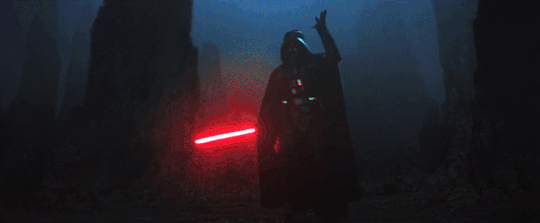
..but he was caught off guard by Obi-Wan's newfound confidence and power boost. His emotional conflict also weakened him, and once Obi-Wan damaged his suit enough so he couldn't breath properly anymore, it was basically over.

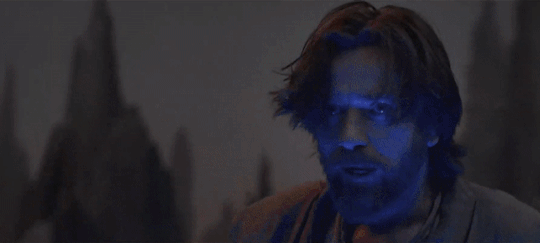
Credit to @david-talks-sw for the gifs; check out his blog.
While I do have my issues with Vader losing to Obi-Wan in the series, I'm glad they at least gave an in-universe explanation so Obi-Wan isn't more powerful then Vader, and thus also Sidious, by default, thus destroying the entire original trilogy.
"Sidious wrecked Vader in Issue #6 of the 2020 comics so you’re wrong"
Yes, in this instance, Sidious was more powerful then Vader. However, saying this proves Sidious is generally more powerful is to completely ignore the context in which this happens.
Vader's quest to find who raised his son after The Empire Strikes Back brought back memories of his mother and Padme, including Vader watching a recording showing Padme still believed there to be good in him.
This created a lot of conflict in Vader, and he began wallowing in sadness and grief instead of being fueled by anger and hatred.
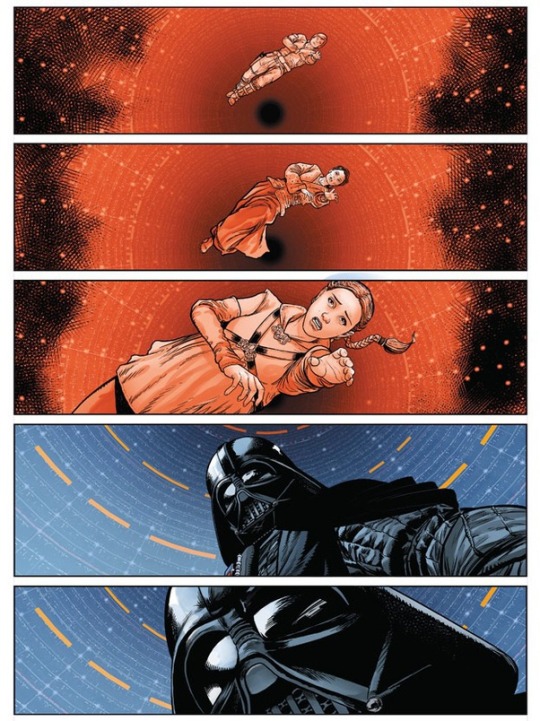
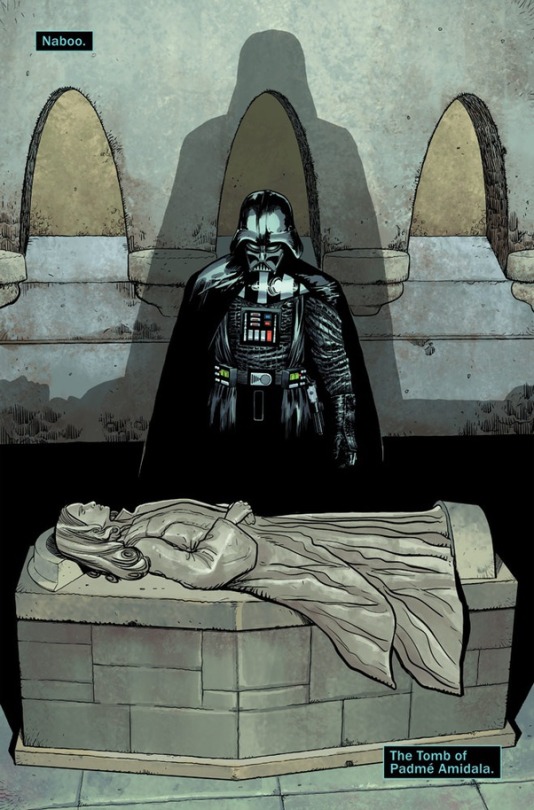
Sidious outright says this.
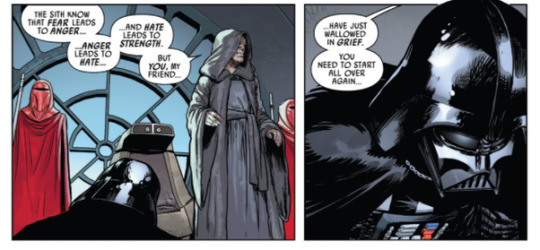
Here, he tells his apprentice that he needs to return to the former power, even acknowledging Vader’s once “unimaginable strength”.
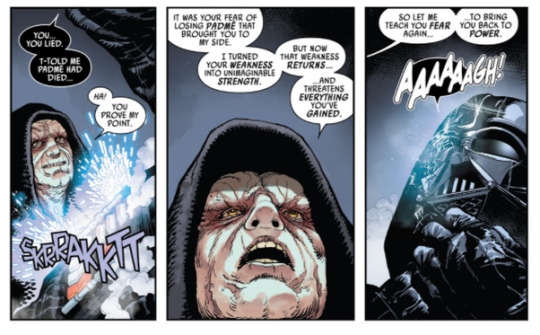
The whole point of this is that Sidious was trying to get old Vader back, and that he shouldn't be able to do this to him.
Sidious easily beats Vader here because he lost himself. This does not prove he was always weaker then him.
“Sidious wrecked Vader in Issue #11 of the 2020 comics so you’re wrong”
I'll definitely concede that in this case, it's more debatable as to whether Sidious is more powerful then Vader.
Sidious avoids a direct confrontation with Vader, instead choosing to lure him into a series of enemies, including an army of Sith cultists and a literal weaponized kyber crystal.

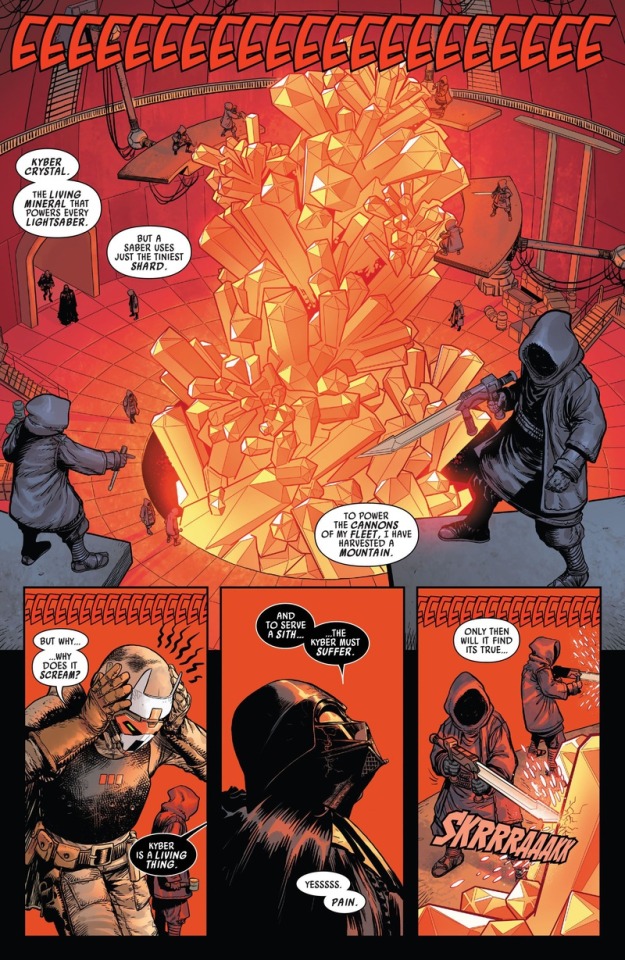
It's worth noting that Vader still isn't in his prime here. After going through many difficult opponents, from a bounty hunter to a giant monster, without the aid of the Force, Vader is tired and literally held together by scraps. And yet he still keeps going, fueled by his rage.
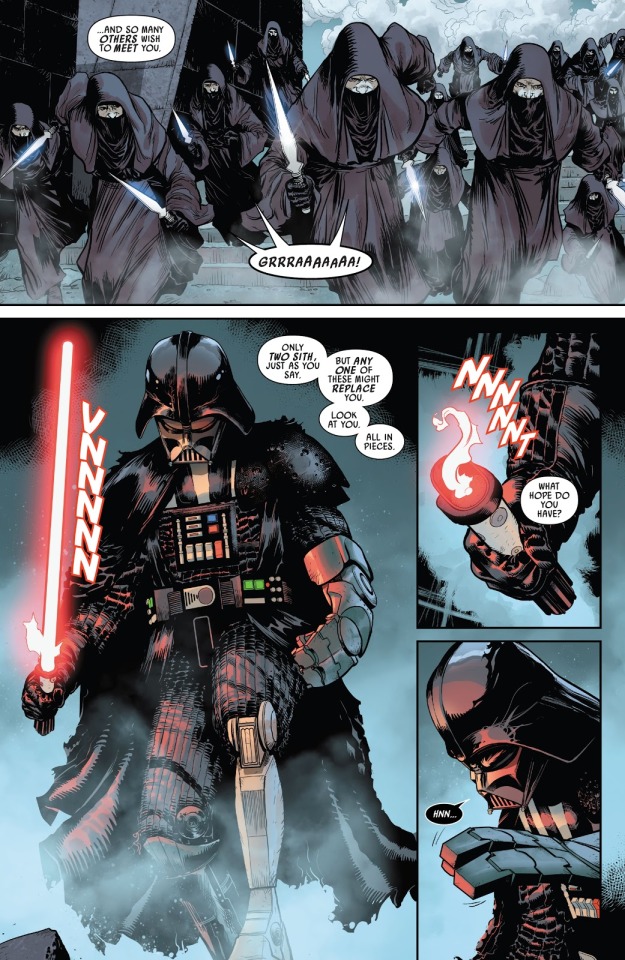

When Sidious activates the kyber crystal, Vader is being harmed, while Sidious feels... nothing. He just stands in front of it.

Is Sidious now more powerful then Vader? Or is this just because Vader is weak because of everything he's been through and still has some conflict within him?
We can't really say for sure. At this point, it's up to interpretation.
The artist of the comic series did say that Vader is more powerful...
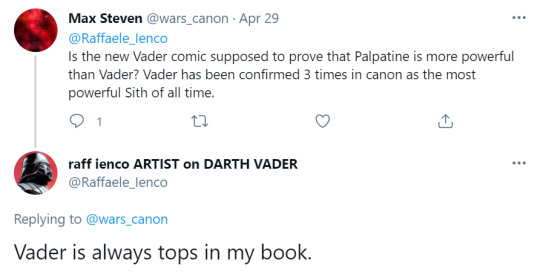
...but this is less of a Word of God statement and more of a Word of Saint Paul statement.
Regardless, it does not preclude Vader being more powerful prior to this comic series. Which is why I always say that Vader from ROTS up to ESB is the most powerful Sith, because after ESB, whether he's actually more powerful then Sidious is debatable.
#star wars#darth vader#sith#most powerful sith#sith lord#the force#darth sidious#vader#sw anakin#anakin#anakin skywalker#kenobi series#obi wan kenobi#star wars original trilogy#star wars prequels#palpatine#emperor palpatine#darth vader dark lord of the sith#star wars canon#darth vader comics#star wars comics
64 notes
·
View notes
Text
Learning that much of the Witch imagery and folkloric/fairy tale references of Madoka were added in by Inu Curry and others at Shaft after Gen Urobuchi finished the scripts certainly explains why there's something of a disconnect between the visuals and how the characters act/react to their surroundings.
According to a quote on Wikipedia, Urobuchi originally envisioned the Witches as looking like conventional monsters a la kaiju like Godzilla. (Which I find amusing, since I've had the image of a magical girl fighting kaiju in my head for a few years now...) Things like Sayaka's Witch being an allusion to the Little Mermaid to parallel her unrequited love for Kyosuke being later additions explain why, when stripping the show of its visuals, Madoka really doesn't have much in the way of fairy tale themes/imagery (at least compared to anime like Princess Tutu, which is something I recall pointing out to someone on Twitter not too long ago). Yeah, the Faust stuff fits, but that's also arguably just the result of Inu Curry noticing the archetypal similarities between the contracts and Faust. And really, stories of deals with the devil are nearly universal, and can't be attributed to only Faust. Fairy tales are full of similar stories, for example (like "The Little Mermaid," since the Sea Witch in the original story was a neutral party akin to Kyubey, but she at least was upfront of the struggles the Mermaid would face).
This also applies to other, non-Witch details like Homura's weird apartment, which no one comments on. As pointed out by Anime Slushie, it's obvious Urobuchi didn't intend for Homura's apartment to be so surreal.
This isn't anything new, nor is it "bad" that Madoka had this kind of development. Lots of visual media have similar developments. George Lucas didn't originally picture Darth Vader as having his iconic helmet, but Ralph McQuarrie added that in in his concept art (McQuarrie noted that Vader traveled from one ship to another in the draft he had, and figured he'd need some breathing apparatus).
This gets interesting when we think of Rebellion and the Magia Record anime, since by then the aesthetic of the franchise would have been locked in, and in the case of MagiReco, Inu Curry was in charge and could do whatever they want (this is why I think the imagery gets confusing there; Urobuchi may not have had much in the way of designing elements for the setting, but I'd argue his script at least held Inu Curry back from going completely confusing with their visuals).
13 notes
·
View notes
Note
For the 50 random character asks
4. Favorite line
For this character ask I’m choosing Luke Skywalker because he is the first character I’ve thought of when it came to memorable lines and also his character has been getting shit on lately with all the anti-Jedi rhetoric going around lately so I’m lifting those characters up 💚
4. Favorite Line
“I Am A Jedi, Like My Father Before Me.”
An absolute classic 💚 I literally have the Luke Loungefly with this exact quote on the back. This quote has stuck with me ever since I first saw ROTJ as a wee lassie and this just cemented my love for Luke because it takes guts to say what he said in that situation. There he is staring into the face of pure evil who has taken his birth parents away from him, responsible for troopers killing his aunt and uncle who raised him, and has threatened the lives of everyone he knows and loves repeatedly (and at that moment things are looking real grim for the Rebel Alliance) along with millions of others across the galaxy. Very few survive their encounter with Sidious but here’s Luke tossing his weapon away after a brief rage episode and standing there completely vulnerable declaring that he is a Jedi and so was Anakin Skywalker his father. Luke would rather die than give up who he is and aid in the continual destruction of lives, even if that meant he didn’t get Vader to turn back to the light. That’s true bravery right there and it perfectly embodies what it means to be a Jedi. Not giving into fear or anger, but to courage. Courage to stand up for those who can’t. Not only did Luke stand up for himself and all the innocents across the galaxy, but he stood up for his father as well, and I think that’s what gave Anakin the strength to come back. It’s that level of unconditional love and bravery that we should all strive for. God, I love Luke Skywalker and you should to! 💚

#luke skywalker#we love and stan luke on this blog 💚#character asks#thanks for the ask!#pro jedi#jedi#jedi philosophy#jedi culture
19 notes
·
View notes
Text
An Argument With a Particular Word of God Quote
Note: I wrote this essay a while ago--several months ago--and then just kind of sat on it; but the quote it focuses on has been crossing my dash again the last day or so and it popped back into my head and I decided to go ahead and share.
So. There is a George Lucas quote, I believe from the Attack of the Clones commentary. And I have. Extremely Strong Negative Feelings About It.
The quote in question:
“[The fact that everything must change and that things come and go through his life and that he can’t hold onto things, which is a basic Jedi philosophy that he isn’t willing to accept emotionally] and the reason that is because he was raised by his mother rather than the Jedi. If he’d have been taken in his first years and started to study to be a Jedi, he wouldn’t have this particular connection as strong as it is and he’d have been trained to love people but not to become attached to them.”
Okay. To be clear, my problem here is not with the attachment definition/philosophy that’s being posited here, nor with the description of Anakin’s attitude towards it. The first half of the first sentence, the part that’s bracketed--that’s all completely reasonable/true enough and I don’t have a problem with it.
It’s everything after that.
TL;DR: I think it undermines other key themes and conflicts with certain story/dialogue points in the rest of the saga (meaning episodes I-VI); and I feel like it says some pretty uncomfortable and/or negative things about emotional growth, childhood trauma, Shmi, and the Jedi Order.
Let’s break it down.
First, this only works if you look at the PT trilogy, Anakin’s fall from grace, in a complete vacuum, and ignore the OT and Luke’s journey. Because guess what? Luke was also raised outside the Order, to an even older age than Anakin, and while he struggled in ESB and he did in fact have to learn the hard way, he did learn. (Also, I haven’t rewatched ANH recently, and it doesn’t tend to get referenced much in these discussions, but I think it’s worth nothing that--yes, everything in that movie takes place over like three days and he doesn’t have a lot of time to think/process/start wallowing in his grief; but when you compare the way he handles things there with the way Anakin reacts in similar situations, and he’s already working from a more solid foundation, one that had nothing to do with being raised by the Jedi.)
Second, it’s a…weirdly deterministic take for a series that otherwise places a lot of emphasis on choice. On people choosing to do better (or to not do better). Again, that’s all over the OT, particularly with Luke and Han and again with the second half of Anakin/Vader’s journey. So this particular quote undermines that broader theme/message in a big way.
Third, it completely ignores the fact that this concept, about change being inevitable and you have to be able to move on and let go? Is articulated first and (arguably) most clearly by Shmi. Right there. In the movie just prior to this. That this man also wrote. (“You can’t stop the change, any more than you can stop the suns from setting.” That entire scene.) The mother whose parenting Lucas is essentially blaming for Anakin’s tendency to codependency/unhealthy obsession in relationships.
I am. Really not okay with Shmi being thrown under the bus like this. And, like, there’s probably a broader cultural whatever about how motherhood is simultaneously idealized and ignored in modern (Western) culture and art, and how that influences the way Shmi is portrayed and used and eventually fridged, let alone how she’s talked about outside the text itself. But like. She did in fact say this. The fact that Anakin didn’t grasp it and internalize it is not her fault.
Which is sort of tangentially related to a sort of…broader issue I have with the worldbuilding, especially when it comes to this idealized philosophy, which is that…yes, of course the Jedi are the Good Guys, and the philosophy they live by is a good one (and also acknowledging its real-world Buddhist roots). I am not in any way disputing either of those points. But the idea that only the Jedi, and only by accessing Jedi training/philosophy/etc. through this pretty narrow set of idealized circumstances, can allow you to be a good person in this specific idealized way/to follow this philosophy of non-attachment and learn how to love without codependency, leaves a really bad taste in my mouth. Especially when you have the same lesson/philosophy/ideal coming from a completely different angle in the same goddamn film. In short, the Jedi aren’t wrong, but they don’t have a monopoly on being right.
Okay. Uh. So those are (that last tangent aside) the writing/structure problems I have with this quote. Namely, it doesn’t entirely line up with the themes and storyline of the six films as a whole, and it doesn’t even mesh with the prior movie in this same trilogy.
But there are other issues here, too.
For one thing, this is…this really doesn’t paint the Jedi or their teachings in a very positive light.
Like…this is basically saying, “of course the Jedi can teach people how to love appropriately and avoid attachment/codependency/obsession/dangerous emotional tangles, that’s What They Do, after all--but only if the student starts as essentially a blank slate and has nothing to unlearn.” That’s…not a good look.
Also, it’s kind of a shitty take on childhood trauma? Yes, it’s hard to learn and grow past these things, but the idea that it’s not possible, aside from the implications about the Jedi Order’s pedagogical abilities, is super discouraging for people who come to this path/philosophy later in life than the Ideal. It implies that emotional growth and healing aren’t really feasible and, again, the only way to be capable of this kind of nonattachment is to start from a blank slate. Which a) I don’t think that’s how people or emotions work; and b) again, a super shitty and discouraging thing to say to anyone who might want to try.
(And before anyone comes at me with ‘there is no try,’ that quote taken at face value has the same issue; but if you look at it in context, it’s about committing to a course of action and knowing what you’re capable of, especially in a fairly simple situation/when faced with a fairly straightforward problem. When you also take into account the later conversation about trying to reach Vader, there’s also an acceptance of the fact that there are other factors that are completely out of Luke’s control here, that all he can do is put his commitment and genuine good faith effort and make the attempt to the best of his abilities, but he can’t simply ‘do’ without the other party meeting him halfway. But that’s another essay for another time.)
Lastly, and this is a much more…it has as much to do with modern fandom discussions as with what Lucas specifically said twenty years ago. But there’s this tendency to use entry into the Jedi Order as analogous to adoption. And that’s not wrong! It’s in fact a pretty good analogy! Even before it got reinforced by certain conversations in the Obi-Wan series! But quotes like this highlight the problem with that analogy, especially when coupled with the age restriction on entry into the Order.
Look. There are a lot of issues with the modern adoption system. I’m not nearly qualified to comment on all of them, beyond acknowledging that Some Shit’s Fucked Up. (Not all of it! But Some.) And one of those issues is that, unless the child in question is a [healthy, white] infant, the chances of them getting adopted are extremely slim. Because there’s this attitude that they won’t really belong, they won’t really be a part of their new family, they won’t really bond/bond properly with their new parents, unless they’re brought in as a blank slate. That the (perceived) greater Difficulties in taking in an older child are Too Much/Not Worth It…that kind of attitude.
And, I mean, I’m not a parent, adoptive or otherwise. I’ve never been fully responsible for raising a child (or for any other human being), and I know that it’s a complicated and difficult decision/task even under the most ideal of circumstances. But the idea that older kids aren’t good enough/don’t count/will never really be the children of their new parents is something I know I’ve seen broken down as a toxic mentality before.
Especially in a culture (fandom) that places such a huge emphasis on found family/family of choice and the bonds that grow from there (aka, the refutation of that idea), why is it that, in certain Jedi-positive circles and when looking at quotes like this one from Lucas, it’s just accepted at face value when it comes to the Jedi Order and their adoption/recruitment practices?
Full disclosure, the age limit is basically The Problem I have with the PT-era Jedi Order’s general practices and the one thing that I genuinely think does at least as much harm as good (or the harm it does is significant enough) and should be re-evaluated when Luke (or Rey, or whoever) rebuilds; I’ve written about this before, but, among other things, this idea tends to become a feedback loop which sets the few exceptions up for failure, which then reinforces the idea that older students will fail, and on and on*; this aside from the issues it presents to the people who aren’t lucky enough to be found in the right age bracket or have the combination of Circumstances working for them that Anakin did to become one of the exceptions; the fact that there are no viable alternatives for training and/or support for said potential latecomers is also a huge part of the problem. Anyway, that’s definitely coloring my views here, especially when we look at the Implications rather than the parts where it’s contradicted by other points in the text itself.
I’m going to sort of wind up here by saying that…after all of that, I don’t think that this quote is entirely wrong, exactly. I’ve written about this before (although maybe not posted it, haha), but I do think that the Order’s habit/background of generally not accepting latecomers, combined with Anakin’s particular background and issues, mean that the Order as it stands in the twilight of the Republic was not necessarily a good fit for him when he was brought to their attention, and that he might have been more stable/successful if he’d been brought in earlier, or if the initial refusal had stood and he’d found a different path for himself.
But boiling that down to, essentially, ‘Anakin Wasn’t Raised Right,’ and in so doing a) ignoring the entire other half of this saga/some of the key themes of this saga as a whole; b) forgetting what Shmi said in the last movie/throwing her under the bus; and c) making everyone involved in this situation look bad…I don’t know, that’s really not the way to do it.
*To avoid yet another long tangent…there is an interesting essay that could be teased out about that one line in the mantra, ‘there is no ignorance; there is knowledge,’ and how it relates to the idea of preconceptions. We see this in this particular discussion, both in a sort of positive light (when someone with no preconceptions approaches the Jedi path/philosophy, there is a strong tendency for them to succeed at it), and in a negative light (the feedback loop re: nontraditional students I mentioned). But it also comes up in other areas--look at how Force Ghosts are handled, for example. How much effort it takes for Qui-Gon to connect with Yoda; how the first assumption is that Yoda is hallucinating. Compare that to Luke, who has absolutely zero preconceptions/prior knowledge about how the Force works and how it relates to death, so that when he starts hearing (and later seeing) Ben, his response is ‘this makes as much sense as anything else I’ve learned in the last week sure let’s go with it.’ And, of course, Yoda that line about how wonderful the mind of a child is, uncluttered by such things. Not to mention the bit I mentioned earlier, about raising the X-wing from the swamp, and how that relates to preconceptions and expectations; also related is one of my favorite Qui-Gon quotes, “Your focus determines your reality.”
Anyway, I just think that’s interesting to contemplate--Jedi are people, after all, and this is a very People problem to have.
3 notes
·
View notes
Text
I started my day crying as I washed my face and put moisturiser on because I was thinking about Paul Muad'Dib and I realised I am the very person you were warned about for feeling too much empathy for the bad guy.
No seriously, I think the idea that empathy is 'dangerous' is itself an incredibly dangerous idea, because with it follows implicit suppositions that, a) empathy misguides your analytical judgement, b) empathy is an inhibition which cannot be overcome, c) the very presence of empathy is damning (ergo, some emotions are just inherently bad), e) by virtue, the presence of lesser or no empathy makes a given judgement 'more logical', (this is damning for the following reason), f) the usual gender stereotype that women feel empathy too much and this broadly inhibits them as a class, and as such the usual audience brought into criticism on this topic - ceaselessly - is female readers/filmgoers, whereas when we are brought to draw on 'empathy' for the poor rapist whose life was ruined by one 'mistake' (e.g. B/rock Turner), empathy is eminently and urgently necessar (to consequently excuse the fact he is a rapist).
No empathy for the victim, of course; naturally this entire model has a vested interest in protecting the status quo, not ever truly challenging anything (empathy is not transformative in any way here) and to not feel empathy for such a criminal is a moral failing (as a consequence of gender: women need to feel bad for rapists). But irrespective of that, 'true' empathy is clearly useful and moving, but it is not the complete picture (nor really the solitary path to justice). From the perspective of narrative, it is actually a task you have to take up. It's still incomplete and not representative of your entire judgement, because it is not clouding, but it is supplementary or indeed even gives you the foundation (the starting point) for your opinion (and relatedly does give system to moral virtue, but that is neither here nor there).
Hard to lay out all of that when the catchy thought-terminating cliche, 'if you felt empathy for them, you missed the point' just makes it an easier time for everybody to make a list of bad guys you're not supposed to even feel a little bad for or understand the point of personality cult and where Paul chafes against that or actively cultivates it or anything. Of course, we know the Good Guys because when you feel bad for the Good Guys, they're instaforgiven and always good, and the Bad Guys are always the Bad Guys who turn to the camera and tell you not to feel bad for them. (To be fair, Paul comes close to this in Dune Messiah. I'm referring to the Genghis Khan line. Iykyk).
Really the ultimate takeaway is that empathy is not the endpoint. It doesn't decide ultimate moral judgement. It is not aberrant to 'logic' and the capacity to recognise another person's perspective and feel something for them and consider their motivations expands your judgement - and your sense of humanity. The folly, to me, is to think there are Good People and Bad People and only Bad People do Bad Things and ever think Bad Things. In this sense the Good People are 'pre-forgiven'; empathy for them is okay because they probably had a good reason to do it and if you already can feel bad for them, it's basically the same thing as it being okay. This weaker model of 'empathy' is fucking bizarre and a tool of tyranny, and in storytelling is the death of sensible analysis. (I also think this model of moral apology is actually why people are so fucking stupid about redemption arc discourse because they have no concept of apology and atonement).
The gender comment wasn't meant to be an aside, because it's not lost on me that this policing on whether it's okay to like a bad guy worms its way into major feminine audiences and when I see male fans casting judgement it's almost always on female fans. No one cares if you like Darth Vader but maybe you got made fun of for quoting the Joker too much. 'He's literally me' over Patrick Bateman (a textual serial killer) is just boys being boys (and missing Patrick's pathos for the sake of edgy self-insert). But does anybody give a fuck about that? Not really, no. I don't think it's sufficient to make a gender commentary and just stop there, and that's not really my preferred style. Because yes, whilst I think that is a motivation here, I do think there are some even deeper movements at play with social marking and delineation in online communities [which gender can service] (e.g. I like the bad edgy characters/you are a villain apologist who likes them the wrong way) which does express itself as harrassment and bullying (it's schoolyard shit, but you encounter this in many walks of life). Fans policing other fans, fans with the 'correct' interpretation above all others which gives you license to make it very clear You Are One of the Good Ones. It's the shibboleth of fandom now: whether you like villains the Good Way or the Bad Way.
The irony is not lost on me that this typology actually reflects the naïveté of the very narrative interpretation I'm describing, and relatedly I think this is why it is genuinely an ongoing and necessary point which needs challenging. There are not People With the Correct Beliefs and People With the Incorrect Beliefs (who only have them because they are bad and evil). Sometimes you might even have the wrong ones. The capacity to reflect on that is actually very necessary. It is seriously necessary.
But then once you get into it, does liking Paul Atreides necessarily reflect real-life apologia for real-life conquerors? Rather the question I ask is, does it open up conversation for that sort of apologia? Because I think that's the question Paul's character is more interested in than just asking you to recognise why he does bad things. There is something a little more complex which isn't putting a judgement on you for empathising: it's using that empathy as an exercise. It's narrative.
That conclusion doesn't substantially matter though because the fandom discourse is always going to be more rooted in bipartisan opinions and the easiest, laziest interpretation (Paul is a self-insert power fantasy/Paul is actually a conqueror you shouldn't like at all, just as an example - insert any other villain where needed) which makes you sound the smartest. Note how long this post is. I wanted to lay out my opinion on the matter with respect to empathy with an attempt to restrain it to the context of storytelling, and it's much too long. It's easier to digest neat little soundbytes and I'm pretentious or whatever.
Paul's a fucking great character, and I can understand why Villain Enjoyers default to this position instead of what I've laid out here. It's easier that way.
I'll end this post with: I hope they adapt Dune Messiah into a film. It's my favourite Dune book.
3 notes
·
View notes
Text
[Anakin's] scar, of course, was Lucas's idea. "I just put it there," Lucas said. "I think Anakin got it slipping in the bathtub, but of course, he's not going to tell anybody that."
nobody says "Darth Vader's actually a pathetic cringefail loser asshole and always has been" more than George Lucas lmao everyone took the scary evil space wizard he made sooooo seriously and he was like "no..... the people must understand...... the true Anakin Skywalker behind the mask is just a regular guy who sucks"
#i love how unserious lucas can be about him#but also like. pointed bc. regular losers do war crimes irl#anakin skywalker#darth vader#sw#quote from 'complete vader' p.127#if i were an artist i would draw this lmao
692 notes
·
View notes
Note
watching people get tons of hate comments/quote retweets on twitter for daring to criticize obi wan and/or defending owen lars…these people really can’t stand any dissenting opinion outside their own echo chamber can they? lol
Yeah, I never really saw the draw in Obi-Wan Kenobi as a character. It’s not even that he was a self-righteous and narrow-minded asshole. I’ve sympathized deeply with fictional characters who were or became objectively awful people who I would feel terrified of, if not despise, in real life before. Anakin Skywalker/Darth Vader is a pretty great example of that.
It’s just that Obi-Wan has no life or interests that are really strong enough to ultimately outweigh his faith in Yoda and the Jedi Council. I partly get why. He never knew life outside of the Jedi Order. However, he’s also just rather shallow and insular in his aspirations. He’s primarily devoted to Yoda at all costs because Yoda and the Council discouraged emotion/individually his entire life. He saw that Qui Gonn, Dooku, Ahsoka, and Anakin never got ahead in the Order trying to be their own people. At worst, some went dark, and Obi-Wan’s primary goal and life trap is security and playing it safe by fitting in with the Order.
Since most of us weren’t recruited by cult soldier leaders from before we could remember, you would expect more people in the audience to relate more strongly to Luke and Anakin because they represent the average person. They know what it is to be people of the real world outside of just Yoda’s cult. They’re not okay with being abused, isolated, exploited, manipulated, and oppressed by Obi-Wan, Yoda, the Jedi Council, and Sidious. While Anakin went about dealing with it in the wrong ways in Revenge of the Sith, he had every right to resent them, distrust them, and want to avoid them after how they treated him over the past 14 years.
As I said in another post, I do think there is a point when a complete lack of individuality and sense of self to blindly serve authority to fit in actually holds people back from actually achieving great things and being heroes, too. Yes, too much individualism and emotional abandonment leads to the dark side, but if you’re always playing it safe by sacrificing your entire sense of self to serve authority without much question or fight to gain their approval and fit in, then how can you really achieve true bravery, heroism, and selflessness either? When your sense of drive and morality is completely based upon external validation from authority figures and a corrupt and outdated doctrine to fit in and be safe, then you’re not really being good because it feels good doing the right thing and helping other people without a thought of reward or validation for yourself from others either. Being truly heroic means being brave enough to stand up for what you believe in and do the right thing, regardless of what others think, and I don’t really get that from Obi-Wan in the narrative most of the time. It just becomes a task. For it to actually be heroic, it has to come from a personal and spontaneous drive, desire, ideal, and moral code from within yourself, too, regardless of the external validation and reward from those with power of authority and clout over you.
I think Obi-Wan, while infuriatingly stubborn in his ass-kissing of Yoda, is s pretty good example of that hero who utterly fails because he never feels confident enough in his sense of self, but his fans always want to make him out to be someone who was more heroic than he ever actually was. Yeah, he wasn’t evil, but he was not a very good person like the Skywalkers at their best, or even his master Qui Gonn. When his stans and Disney try to make him out to be anything better or more tragic than that annoyingly one-note “true believer” Jedi in the main narrative, that’s when I start to get irritated and roll my eyes.
I do think a big part of it comes from the fact that he’s played by Ewan McGregor in the PT movies. Don’t get me wrong, the guy is a good actor, and yes, very easy on the eyes. However, the character he plays in Star Wars was never too much of an intrigue to the main audience before the prequels cast him in the role of Obi-Wan.
Owen Lars had every right to tell Obi-Wan to fuck off and stay away from his son when he caught him requesting to recruit Luke as a child to be a Jedi. I mean, how can anyone watch what happened to Anakin, Obi-Wan Kenobi, Ahsoka, the Jedi younglings, and every other Jedi recruit in the prequel era, and think to themselves, “Yoda and the Council did a good job raising these kids to be healthy, functional, and independent adults,” even though every Jedi we meet in the prequels is a fucked up tragic mess of a human being as an adult in one way or another, regardless of whether they remained in the Jed or not? Let Luke Skywalker be a normal kid before getting involved with the Jedi.
#anti obi wan kenobi#anti kenobists#anti obi wan show#pt jedi critical#to be fair I don’t hate obi-wan and I do think he’s a tragedy#but I don’t find him all that interesting because he doesn’t really have a character arc#and I don’t think he’s a tragedy for the same reasons his stans#like I don’t think he was ever this great hero who did his best#I think he became a coward and a hypocrit who lacked
23 notes
·
View notes
Note
I personally don't see the prospect of Karen being related in any way to Eleven.
However, depending on how inspired and how much of a parallel ST would like to make with Star Wars, it is very plausible that Henry is Eleven's father.
In researching character profiles, Henry and Eleven's mother are of similar ages. In theory, they could possibly have met outside of the program, have already been in a relationship and conceived Eleven prior to them both commencing the program or alternatively, they could both have met during volunteering for the program, established a relationship and ended up finding out they were having a child together.
Eleven's mother gained abilities from participating in the program, as we saw within the show when she wanted to connect with Eleven via the television scene. It could be assumed that Henry also gained some abilities, that exceeded far beyond their expectations and when they discovered he had a potential child, they wanted to seize her too.
Henry would have been confined to the lab as a form of damage control, because his abilities had become so strong and uncontrollable, which would have made them further curious about what potential power that Eleven could possess too.
In season 4, when Eleven is rediscovering her abilities, Brenner is shown to be acting very suspicious and uncomfortable in scenes where Henry interacted with Eleven, like he didn't want him to be near her but maybe not just for the obvious reasons. Possibly because yes, Papa lies and he isn't telling the whole truth. He even punished Henry severely for being around Eleven. It could be because there was more that Brenner was worried about her finding out. Brenner also prevented Eleven's mother from seeing her, using violent methods to keep her away. Perhaps she would have told her some truths too. Henry was very aware of who Eleven's mother was when she came to the lab. He may not have completely acknowledged her as being possibly someone he knows very closely, but if he does, revealing it at that point in time would ruin a future S5 plot twist.
There have been many Star Wars/Vader parallels with Vecna.
The murder of the younglings
The massacre at Hawkins lab
Being banished or exiled
Transforming into their complete villain arc, including by appearance
Henry made several very similar comments to Eleven during their conversations
You and I are not that different (not exact quotes)
I hoped you would be beside me
This all has very Together we can rule the galaxy vibes
Not to mention that Henry infact taught Eleven more about using her powers than Brenner ever did. Brenner never wanted her to train from a place of anger, yet Henry taught her how to do this, just as he had done so himself
Will the plot twist be that Henry is infact Eleven's father as they duel it out in an apocalyptic battle? Who knows
But I doubt it has anything to do with Karen being related to Eleven in any way
yeah it's possible I guess but I would find it awful to be honest and hate it and pretend it didn't happen ♥️
10 notes
·
View notes
Text
Finished the draft for LiE #94 🥳
Proud of myself to be ahead of schedule for once, so I’m gonna share the very sappy end of it. Remember: I will completely rewrite the whole thing again 😂
If anyone hates spoilers: Scroll away now!
Draft LiE #94 sneak peak:
When he put his little gift next to Nicolas’s, the table was set. Marshall sat down on a decorative pillow, he didn’t want to ruin his couch with whatever fluids still stuck to his ass. Even if Nicolas seemed surprisingly good with cleaning agents. »You planned this all out, didn’t you?«, less of a question and more Marshall realizing he wasn’t the only one who had a lot of thoughts about their dates.
Was him sitting here all horny and half done part of Nicolas’s plan? These plays always did a lot more than just fucking his holes until they both came and Marshall wasn’t quite sure what the point was. Though judging by Nicolas’s mean smirk, the point was to see Marshall squirm. Not the worst point.
»It’s our half year anniversary«, Nicolas answered, a warm smile brightened up his face a little bit. »I love when you’re being silly and sappy and sentimental.«
Marshall leaned over for a loving kiss. »Open it«, he pushed his gift closer to his boyfriend. He shifted on the pillow, his hole begging to be stuffed like earlier.
Carelessly Nicolas ripped the wrapping open. A flat wooden box appeared underneath, polished wood grain was a work of art. Inside on a bed of black velvet lay a Damascus knife. Looking up, Nicolas smiled at him honestly delighted. »You always know exactly what I want.«
Marshall doubted that but he didn’t argue. He just wanted to make his boyfriend happy because he loved him. Plain and simple. »Glad you like it.«
»Everything from you«, one more kiss. Then a gesture his gift was to be opened.
Marshall was more careful with the wrapping paper. It was a picture frame, classy black wood with a light pattern around the edges. On the right-hand side smiled their photograph, soft morning lights and both their hair was a mess. One of the many great mornings they had spent with each other, warm and lovely and like a happy movie couple. On the left-hand side was a quote carved into the wood in a fancy font: All because two people swiped right. Marshall chuckled. Indeed surprising how a stupid app had changed his life for the better so much. »You always make me laugh«, that was the strength in Nicolas’s gifts.
Nicolas winked and flicked his finger against his glass with the red drink, inside clanged an ice cube with Darth Vader’s face on it.
Marshall laughed even more and yet he managed to kiss his boyfriend anyway. These past six months had been quite eventful and Marshall was grateful for every single day, even the dark ones. They all let him to here: Being happy and in love with another man.
#writeblr#am writing#first draft#sneak peak#spoilers#love is evil fanfiction#sappy hours#two idiots in love
2 notes
·
View notes
Text
One Dream, One Vision by Severnlight ( @severnlight )
After the disastrous duel on Bespin, more than mere words transpire over the newly forged bond between father and son. And this time, R2 is not so lucky with the hyperdrive. Darth Vader is beyond pleased to finally have his son in custody, but the Force keeps whispering something about the terrorist Princess as well.
With the identity of Lord Vader's long lost son revealed, every being of some consequence from Core to Outer Rim is busy plotting their own schemes for Luke Skywalker. The young rebel is trying his best to navigate the new relationship with his father, and scramble a plan or two of his own. Admiral Piett and various unsuspecting Imperial citizens are entangled in the drama. Vader acts completely unpredictable, the threads of destiny are tossed up in the air, and the Galaxy holds its breath. Ongoing, 43k words.
*** ** * ** ***
Chap 12 :
Curiosity killed the Admiral, perhaps permanently this time. Killed permanently. He was going to request for that memorable quote to be etched on his tombstone. "By curiosity", as an added footnote.
#fragments of imagination#even stars burn out#star wars#pray for piett#i love this quote so much xd#the fic was a very nice read!#darth vader#luke skywalker#vader & luke#fanfic#sw fic#star wars fanfic#star wars fanfiction#sw fic rec#star wars fic rec#star wars fic recs
4 notes
·
View notes
Text
I know this is nothing new but this grinds my gears when I see this kind of stuff because people say exactly what's on their minds when it comes to this stuff and they're loud about it and yet somehow people still come to their own conclusions anyway.
Pete Docter did an interview on Lightyear, he wasn't director but he was producer and a long time Pixar creative.
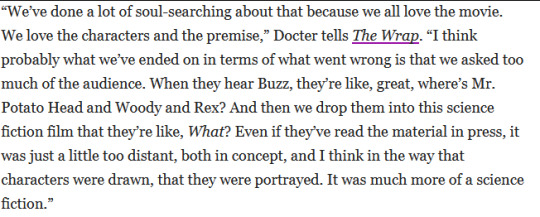
But who thought this? You'd have to be completely oblivious or in a bubble to think "Where's Woody and Mr. Potato Head?" what the actual- How in the world would you even put two and two together that this was even connected to Toy story if you thought that? I just can't believe that THIS was the reason you came up with. There's more to that quote though.

No, I think what people wanted was a disconnect and what you gave them was something just haphazard. Maybe you made it, maybe you like it, that's fine, but this is not the reason the majority of people didn't like your movie. It wasn't that it was different. Quite the opposite, it was that it was trying to be like something else. I'm thinking along the lines of Marvel/Star Wars, I mean you hired Chris Evans for one, but I'm not going to hold that against you but that you didn't take your own plot seriously and made 90% of your characters are comic relief because Marvel popularized movies making jokes apparently. The "idea" of a spaceman jumping through hoops to beat his top speed in order to get everyone back home after being trapped on this planet resulting in time travel- Not only that! But Zurg in general, as a villain, has massive potential and I'm not talking about a Darth Vader rip either, I mean look at some of this cool stuff

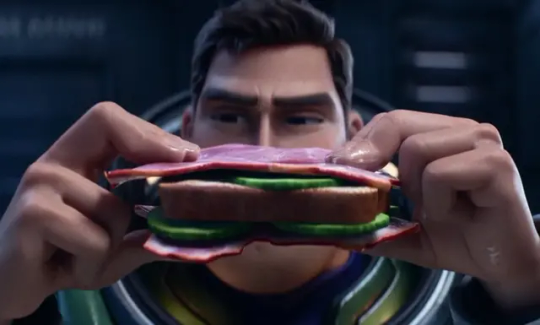

Random little weird sci-fi stuff. Water (elemental ref) in a vitamin jar. Sandwich in a box. A vending machine with these things, it's like an in between of real sci-fi and a toy, which is EXACTLY what this movie should've been and was where it shined for me but it merely didn't have enough of that to capture that feeling. Look at their knives, someone liked it enough to make a replica

That's because it's not just a knife, it's a laser knife, it's detailed but also simplistic, not like an irl one would be but A TOY, a good toy I might add and it fits my exact description that I was just going over.
But everything else feels so forced by the end of it and we spend the majority of the movie focusing on the wrong stuff, we focus on those comic relief characters like it's a Minions movie.
In fact the idea of unfamiliarity isn't entirely false because we had Buzz Lightyear of Star Command. Sure, that wasn't Pixar and I don't really blame them for not using its material or characters for that sole reason but they couldn't have thrown something- anything in there as a nod to those fans? That show is very different from Toy Story and proved your claim wrong years before you did it. And those characters were extremely more likeable and they were aliens! And they made jokes but not so much that they couldn't be taken seriously! Like actual characters! It wasn't that a Buzz Lightyear spinoff didn't have potential, it was that it was done in bad taste. Money!
#lightyear#just helping#pete docter#refer to this#pixar#here's the reason#i'm giving it to you#read this#i will help you#just do it
1 note
·
View note
Text
And people called me a fool! "we've moved past that" they said, "it's no longer about 'does it count as art', but copyright questions" they said!
Funny how it came right back around to "it doesn't count as art". Funny that people hate copyright and all the annoyance it brings into our world and talk of how much of a disaster the system is until the moment someone sells it to them as literally protecting humanity against an existential threat, that their favorite artist, Timmy Poverty, will starve and die because someone didn't pay them to paint Gay Sex Cats, a thing that was a realistic possibility and would totally have happened.
Many of these same people will turn and defend piracy! To be clear, while I have not engaged in piracy, I think it's often fine, but the point is, as a general rule, piracy is closer to theft than "a computer looked at an image you made once and then did some math on it, and attached some tags to that math." You know what else looks at images and does math on it and attaches tags to it? Humans! Humans do that literally all the time, that's what vision is, that's how brains work! Literally everyone is stealing every image they've looked at and every book they've ever read by this definition! Arguably, humans steal more than the AI, because the AI can't actually remember the text of the work or images they've looked at (because that would eat up storage space), just use math and tags to generate what that text might have looked like or the image might have been. Humans can directly quote things from other works, and draw things they've seen! Pretty copyright infringementy if you ask me. Why, you could go up to a Star War fan and they could tell you hundreds of lines from memory! We need to do something about that, what if they think about Star War without paying for tickets to see a Star War? What if they think about Darth Vader's Helmet? What if they draw a picture of his helmet? What then? That's basically stealing, they didn't come up with the idea for Darth Vader or Star War!
"Oh it's just an average of human work" what precisely do you think humans are doing that's different? Are humans magic? If so, state that in your premise, because I'd like to not have to coax you into saying "humans are magic, actually, and that's why an image they made after being asked to make an image of something specific is more creativer than an image made by an AI after the AI is asked to make an image of something specific" so I can ask you why you didn't state that you are arguing the human mind is powered by incomprehensible magic from the start.
Annoyance aside, I do think something very important to recognize is that people are computers too, just meat-based ones specialized in storage space and image recognition. Meat brains are probably Turing complete, to the extent any computer of finite size can be. Pretending humans are special and unique and different is how we get all kinds of problems, so why are we pretending that this is the time humans really are special and unique and different from all else, and this time copyright law is super good and smart?
0 notes